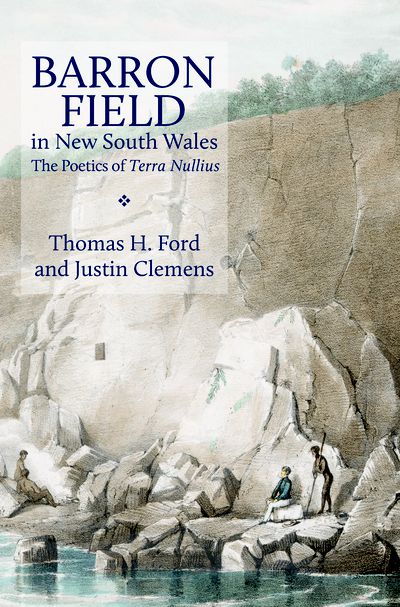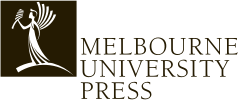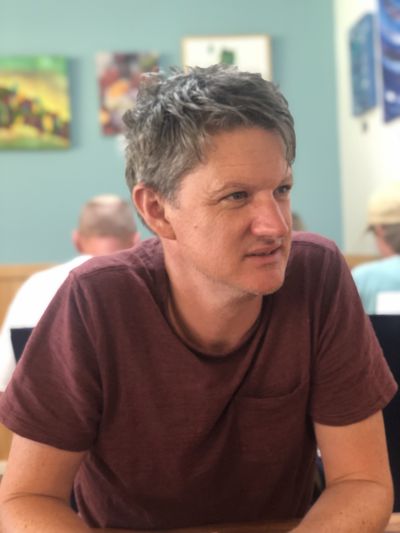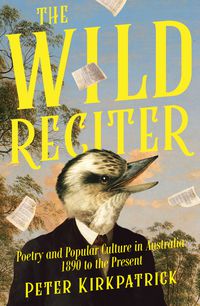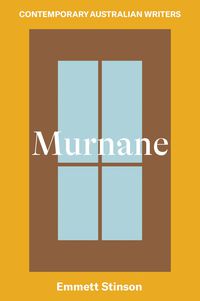Barron Field in New South Wales
The Poetics of Terra Nullius
Thomas H Ford, Justin Clemens
Paperback
Out of stock
$35.00
Member discount
As an MUP member you get 40% off the price of this book.
Member discount
As an MUP member you get 40% off the price of this book.
Member discount
As an MUP member you get 100% off the price of this book.
Member discount
As an MUP member you get 25% off the price of this book.
Member discount
As an MUP member you get 25% off the price of this book.
Member discount
As an MUP member you get 25% off the price of this book.
Member discount
As an MUP member you get 40% off the price of this book.
Member discount
As an MUP member you get 10% off the price of this book.
Member discount
As an MUP member you get 35% off the price of this book.
Member discount
As an MUP member you get 40% off the price of this book.
Barron Field in New South Wales
The Poetics of Terra Nullius
Thomas H Ford, Justin Clemens
What does the first poetry in Australia, written by the Judge who declared the land terra nullius, tell us about the singular nature of colonialism here?
On 24 February 1817, Barron Field sailed into Sydney Harbour on the convict transport Lord Melville to a ceremonial thirteen-gun salute. He was there as the new Judge of the Supreme Court of Civil Judicature in New South Wales - the highest legal authority in the turbulent colony. Energetic and gregarious, Field immediately set about impressing his vision of a future Australia as a liberal and prosperous nation. He courted the colony's leading figures, engaged in scientific research and even founded Australia's first bank. He also wrote poetry: in 1819, he published First Fruits of Australian Poetry, the first book of poems ever printed in the country. In England, Field had been the theatre critic for The Times, and a friend of such major Romantic writers as William Wordsworth, Charles Lamb and Leigh Hunt. In New South Wales, he saw the chance to become a major figure himself…
On 24 February 1817, Barron Field sailed into Sydney Harbour on the convict transport Lord Melville to a ceremonial thirteen-gun salute. He was there as the new Judge of the Supreme Court of Civil Judicature in New South Wales - the highest legal authority in the turbulent colony. Energetic and gregarious, Field immediately set about impressing his vision of a future Australia as a liberal and prosperous nation. He courted the colony's leading figures, engaged in scientific research and even founded Australia's first bank. He also wrote poetry: in 1819, he published First Fruits of Australian Poetry, the first book of poems ever printed in the country. In England, Field had been the theatre critic for The Times, and a friend of such major Romantic writers as William Wordsworth, Charles Lamb and Leigh Hunt. In New South Wales, he saw the chance to become a major figure himself, someone who could shape culture and society in enduring ways. Founding Australian poetry was part of that ambition; so too was law. Asked to determine whether Governor Macquarie had authority to impose taxes in the colony, Field issued a fateful judgement that established, for the first time, what is now called terra nullius. This book is an extraordinary reconstruction of the circumstances and implications of Field's actions in New South Wales using an original and revealing method: the close reading of his poetry.
“
Barron Field in New South Wales offers a dazzlingly original argument, presenting terra nullius as not merely a juridical intervention but also a literary one.”
The Saturday Paper“
Building on the unpromisingly barren ground of the Australian colony’s first poet, Barron Field, Clemens and Ford construct an exemplary close reading of the cultural domain in which he wrote and of the connection between his poetry and the doctrine of terra nullius. This is literary criticism at its most powerful, illuminating the ‘complex networks of living’ underpinning the late-Enlightenment liberal order on which the dispossession of the Indigenous inhabitants of the colony was established.”
John FrowPaperback
Out of stock
$35.00
Member discount
As an MUP member you get 40% off the price of this book.
Member discount
As an MUP member you get 40% off the price of this book.
Member discount
As an MUP member you get 100% off the price of this book.
Member discount
As an MUP member you get 25% off the price of this book.
Member discount
As an MUP member you get 25% off the price of this book.
Member discount
As an MUP member you get 25% off the price of this book.
Member discount
As an MUP member you get 40% off the price of this book.
Member discount
As an MUP member you get 10% off the price of this book.
Member discount
As an MUP member you get 35% off the price of this book.
Member discount
As an MUP member you get 40% off the price of this book.
